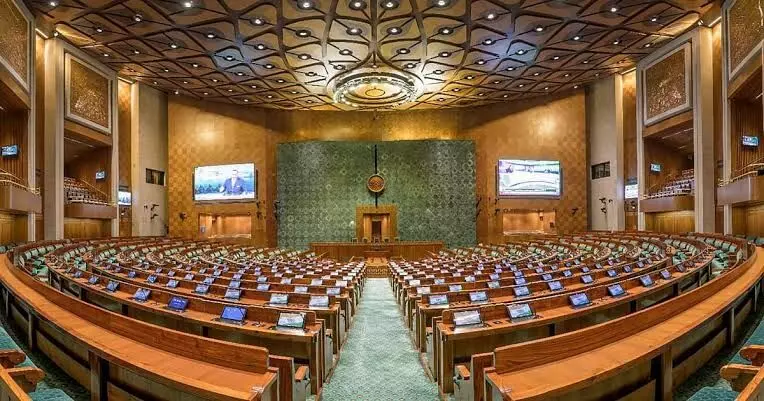Delimitation: How Southern states will lose 17 seats in a jiffy
According to Article 82 of the Indian Constitution, after each Census, the allocation of Lok Sabha seats must be adjusted to reflect population changes
By Irfan Aziz
Delimitation: How Southern states will lose 17 seats in a jiffy
Hyderabad: Delimitation refers to the process of redrawing parliamentary and assembly constituencies based on population changes following each Census. It is a constitutional requirement carried out after every Census to adjust the number of seats in Parliament and state Assemblies and to redefine constituency boundaries.
According to Article 82 of the Indian Constitution, after each Census, the allocation of Lok Sabha seats must be adjusted to reflect population changes. However, Article 81 limits the total number of Lok Sabha members to 550, with 530 allocated to states and 20 to Union Territories. It also mandates that the ratio of seats to population in each state should be as uniform as possible, ensuring that constituencies across the country have approximately equal populations.
Delimitation has occurred four times in India's history: in 1952 under the Delimitation Commission. In 1976, Prime Minister Indira Gandhi suspended the delimitation of Lok Sabha constituencies until 2000. In 2001, under Prime Minister Atal Bihari Vajpayee, delimitation was reintroduced, with a timeline set to expire in 2026. However, the idea of a population-based delimitation for Lok Sabha constituencies has faced strong opposition from the southern states.
The key issue for us (southern states) is that a population-based delimitation would unfairly benefit the northern and central states in the Lok Sabha. States like Telangana, Kerala, Andhra Pradesh, Karnataka, and Tamil Nadu, along with eastern states like Odisha and West Bengal, would be penalized for their successful implementation of family planning initiatives. On the other hand, states such as Uttar Pradesh, Madhya Pradesh, and Bihar, which have struggled with family planning and experienced significant population growth, would gain additional seats in the Lok Sabha. This shift in seat allocation would concentrate political power at the center, undermining the federal structure of the Indian government and the foundational principles of the Constitution.
Looking ahead to the post-2026 delimitation, the situation will become even more disproportionate. Bihar, Madhya Pradesh, Rajasthan, and Uttar Pradesh together will hold a total of 222 MPs, a gain of 22 seats, while the four southern states will only have a combined representation of 165 MPs, a loss of 17 seats. This outcome is a clear injustice to us, especially given that southern states are major contributors to the nation’s GDP and actively drive national growth. We are being penalized for diligently implementing family planning policies, while northern states, which are not contributing to economic development proportionate to their size and population, would be unfairly rewarded. This, I believe, will be a significant setback for the Southern states.
I have two potential solutions to address this issue. The first solution is to completely halt the delimitation process, as it could create a divide between the North and South, leading to lasting tensions for generations. The second solution is to proceed with the delimitation, but with the condition that any additional seats should be allocated to those states for the economic performance in terms of SGDP. The state with the highest SGDP should be given the most MP seats, followed by the others in descending order of their SGDP. For example, since Maharashtra is the richest state, it should receive the highest number of MP seats, followed by Tamil Nadu for is the second richest state. The second solution option will drive all the states to focus on economic development and growth, thereby encouraging healthy competition among them.
Irfan Aziz is All India Professional’s Congress chapter president and TPCC media and communication state convenor.
Disclaimer: The views and opinions expressed in the article are those of the author and do not reflect the official policy or position of NewsMeter.